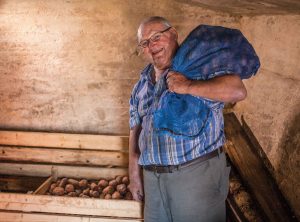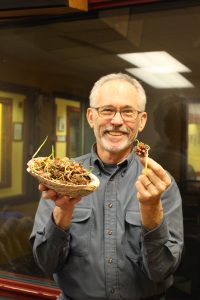Rooted in the Past, Growing a Greener Future
In recent years, there has been an uptake in home gardening and self-sufficiency with online gardening groups emerging in the community and frequent sights of raised garden beds and backyard greenhouses. Increasing efforts to revitalize and restore root cellars have also emerged.
Over forty root cellars in the town of Elliston have been restored or completely rebuilt. Traditionally, root cellars in Elliston were constructed from local materials; Rex Chaulk recalls that spruce logs were used in the construction of cellar ceiling peaks, flat rocks from the cliffs on the shorelines were used in shaping the cellar walls, while stones and sod for the walls were sourced from the potato gardens. Restoring root cellars begins with measuring the cellar compartments, then rebuilding the walls and ceiling.
The future of root cellars in Newfoundland and Labrador is promising, as increasingly people are looking back to their traditional roots for inspiration and moving towards sustainable lifestyles. Not only are people restoring old cellars to continue their use, but they are also creating new types of cellars as they look towards the future.
Pouch Cove resident Dan Rubin has done exactly that, through the design of a sheltered greenhouse that combines the traditional root cellar with a greenhouse built of modern materials. Working with students at Memorial University, Rubin was able to create an effective design for what he termed an “earth sheltered greenhouse.”
The design is a concrete back wall for support, buried in the earth, the front is corrugated polycarbonate plastic, facing south, at an angle that matches the local winter sun angle. The metal roof serves as a water catchment, draining into storage tanks inside the greenhouse, and fully insulated to hold in warmth. You enter at one end into a small room that acts as airlock and office. There is room for two 16-foot raised beds plus a work surface large enough to plant $1200 worth of bedding plants in one planting…Once we saw how cheap it would be to heat this space we knew we had found a real game changer. This design could allow a group of friends in a coastal outport to become food producers for their local community.
-Dan Rubin, Perfectly Perennial, Pouch Cove.
Rubin believes that the ease of constructing and heating this structure will allow for social enterprise opportunities to emerge. It is hoped that the creation of next-generation root cellars and community gardens has the potential to restore food security to communities across the province.
Dan Rubin discusses the future of root cellar technology. Enjoy this audio clip with an English transcript.



